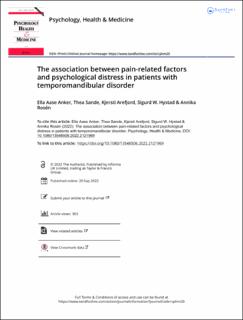The association between pain-related factors and psychological distress in patients with temporomandibular disorder
Journal article, Peer reviewed
Published version

Åpne
Permanent lenke
https://hdl.handle.net/11250/3049281Utgivelsesdato
2022Metadata
Vis full innførselSamlinger
Sammendrag
Chronic pain is associated with high levels of psychological distress, which can have implications for general functioning, acceptance, quality of life, and compliance with health-promoting behaviour. This study explored the association between pain-related factors and psychological distress in a sample of patients with long lasting temporomandibular disorder (TMD). In this cross-sectional study design, psychological distress was measured in 133 Norwegian patients with long lasting and severe TMD. Participants completed a survey including the hospital anxiety and depression scale (HADS), and questions about pain intensity, pain duration, catastrophizing, and causal attributions of their TMD symptoms along with a clinical interdisciplinary investigation. Higher levels of catastrophizing were associated with psychological distress. Pain intensity was associated with psychological distress in the unadjusted model, but not when controlling for the other variables. The majority attributed their TMD symptoms to physical factors. The findings support psychological interventions aimed at reducing catastrophizing in treatment of TMD. However, the patients emphasized physical causes for their TMD symptoms, suggesting that psychological interventions alone are not sufficient. The findings support a multidisciplinary approach to the treatment of TMD.
